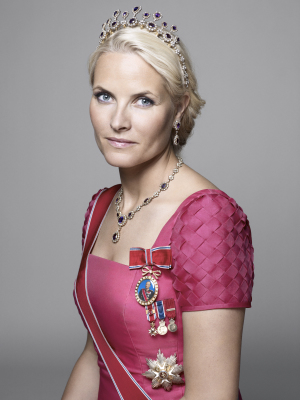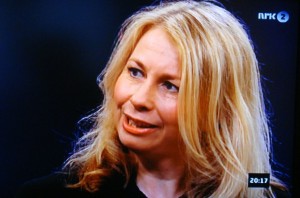By embracing a jet-set lifestyle and fondness for the luxury it offers, Norway’s Crown Princess Mette-Marit has shown how Norwegian society in general has become “nouveau riche” at the expense of long-held traditional values. So claims a sociologist and college instructor from Telemark, who was making waves this week for some rather sharp criticism of the former party girl and single mother who will be Norway’s next queen.

Hedvig Skonhoft Johannesen appeared on national television Monday night, just before public release on Tuesday of her contribution to an ongoing series of pamphlets being published this year by respected literary firm Aschehoug. One pamphlet is being published each month during 2013 in connection with the 100th anniversary of women’s right to vote in Norway.
The series, entitled Aschehoug Stemmer (Aschehoug Voices) is being written by 12 women who want to contribute to the public debate. The aim is to provide a public arena for social issues and “what’s happening” among women in 2013, according to Aschehoug. “This isn’t about what it means to be a woman,” writes Aschehoug in presenting the series, “but what women mean.”

Johannesen is keen to spark debate over the monarchy and the crown princess as a role model. Johannesen thinks a political discussion over the role of the monarchy in modern Norway has failed to materialize largely because politicians are reluctant to bring it up. An attempt was made just recently, but didn’t get very far.
Johannesen believes Crown Princess Mette-Marit reflects a newly affluent Norway that’s no longer reluctant to flaunt its wealth. By marrying the crown prince, the former Mette-Marit Tjessem-Høiby greatly increased her social status and the couple “views charitable work as important penance, while solidarity, modesty and equality no longer are on the agenda.” Rather like how Norway itself has grown wealthy, increased its status among nations and offered billions in foreign aid over the years while adopting protectionist policies at home.
Mette-Marit, notes Johannesen, is in a unique position as the crown prince’s wife. “Everything she does, says and wears become topics of discussion,” Johannesen contends, examining the crown princess’ role as “an icon, as a woman, as a role model and reflection of the nation she represents.”
The problem, according to Johannesen, is that Crown Princess Mette-Marit isn’t a good role model in traditional Norwegian terms. Rather, claims Johannesen, she seems to revert back to the 1950s, when women rarely had careers of their own, had little financial independence and were meant to bear children.

“Her entire status hinges on her marriage to a prince,” Johannesen told Norwegian Broadcasting (NRK). “That’s the sole basis for her leap in class.”
Johannesen criticizes Mette-Marit’s lack of higher education and the role of dependent wife she has taken on. “According to the way she’s portrayed in the media, she’s most concerned with showing strong feelings, wearing glamourous gowns and dealing with children and family,” Johannesen said.
Asked what else a princess should do, Johannesen responded that “in our modern, democratic society, a woman who has married into her position and is preoccupied with children, glamorous clothes and travels around Africa with a Prada handbag on her arm to perform charitable work isn’t a very interesting role model.”
The sociologist went on to say that Mette-Marit’s use of a professional make-up artist during official trips “reinforces the ideal that we women shall be perfect icons and looking good at all times.” Given Mette-Marit’s background and lack of higher education at the time of her marriage, Johannesen suggests public expectations of her role were low, leading to an indifference that may be another reason as to why she hasn’t been the subject of an academic study before.
Carl-Erik Grimstad, a media researcher and former palace official, said Mette-Marit “has gone into the traditional role of a rich man’s wife. She has commitment on the one hand and an expensive bag on the other.” He stresses, though, that her job as a member of the royal family is simply to be an icon, “and you can’t complain about someone for doing their job.”
Johannesen, who earlier has commented on the crown couple’s ever-widening circle of celebrity friends and acquaintances, complains most about the job done by Norwegian media, which “let themselves be directed and edited by the royal family’s strict media strategy.” Grimstad responded that there’s “no tradition in Norway for criticism of the monarchy.” Some media, including newspaper Aftenposten, have vastly reduced their coverage of the royal family. Grimstad noted that such indifference can be both the royal family’s best friend and worst enemy.
Crown Princess Mette-Marit was invited to join Johannesen on NRK’s live debate programs Monday evening, but declined. Officials at the Royal Palace had no comment on Johannesen’s work.
Views and News from Norway/Nina Berglund
Please support our news service. Readers in Norway can use our donor account. Our international readers can click on our “Donate” button:

